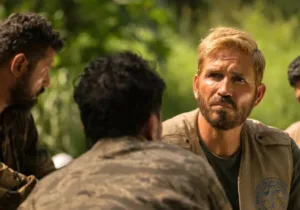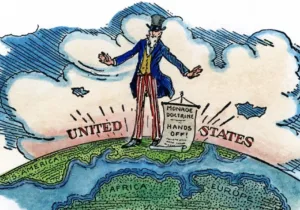The truck kept coming. Corporal Jonathan Yale and Lance Corporal Jordan Haerter quickly went through the escalation-of-force procedures, warning the driver to stop. Yet, the truck kept coming, attempting to speed its way through the serpentine jersey barriers like a macabre slalom. Its purpose was clear.
The two Marines, twenty-one and nineteen-years-old, manning the watch together at the entrance gate of an outpost containing a makeshift barracks housing fifty Marines, opened fire, letting fly as many rounds as they could. Around them, Iraqi policemen, assisting in security, did the sensible thing and ran. The Marines held their ground, their rounds chewing up first the truck’s grille and then punching through the windshield, shattering both glass and the bodies of the assailants. The truck slowed before it could reach the gate. Then it detonated.
The Marines were killed in an instant. Explosives experts later estimated that the vehicle was laden with over 2,000 pounds of explosives. Had the vehicle not been stopped where it had, the barracks would have been destroyed and all the Marines killed. As it was, everyone but Corporals Yale and Haerter survived. Interviewed later, one of the Iraqi policemen was in awe that the Marines had not run. Through a veil of emotion he stammered, “In the name of God, no sane man would have stood there and done what they did. They saved us all.”
I’ve written elsewhere before of the notion that you can tell a hero by the direction they are running. The modest amendment here is that sometimes they don’t run at all. But what’s clear is also simple: they do what the occasion demands.
This idea is seen in an extraordinary little short story by Stephen Crane. In The Veteran, we receive the story of Old Fleming, whose courage spans from the battlefield to the home front. Fleming doesn’t countenance romantic notions of what he’s done, he just says it like it was. In the story’s beginning, the old veteran is speaking with neighbors in the rural grocery about his wartime experience. Listening to him reminisce, the grocery finally asks breathlessly, “You never was frightened much in them battles, was you?” Crane tells us that the grocer speaks in a deferential tone that proves the old man’s social status. However, surprising his listeners, Fleming laughs quietly and answers to the contrary, “Well, I guess I was pretty well scared, sometimes,” he says, “In my first battle I thought the sky was falling down. I thought the world was coming to an end. You bet I was scared.” Everyone laughs at his honesty, surprised perhaps that he admits his fear. But he continues, “Of course, afterward I got kind of used to it. A man does.” And having gotten used to it he did his task in the tumult of war. It appears true that habits, even moral habits like courage, are, well, habit-forming.
This Veterans Day, as we look upon those around us who stood firm in their wartime duty, it’s important to recognize that our nation’s warfighters are not often, if ever, born gods of war. For C.S. Lewis, reflecting upon medieval chivalry, a central key was in remembering the knight “is a work not of nature but of art; of that art which has human beings, instead of canvas or marble, for its medium.” In our inaugural week, Providence receives this fact as a mandate: we need to assist those institutions charged with the moral formation of our young by articulating moral frameworks sufficient to empower their task of raising knights – warriors who are known for the manifestation of the virtues, including habits of charity and courage, and for their resistance against what Augustine called the true evils of war: a love of violence, revengeful cruelty, implacable hatred, the lust to dominant, and the like.
It is not “the military” nor “the government” that will be primarily responsible for the production of knights – of just warriors. Rather, it is, above all, the family, and, secondarily, our places of worship, our schools, our civic institutions – all those relational associations that fill the space between the individual and the state and make up civil society. Impeding this, and lurking in the background of this project, is the civil-military relations of our land.
In the way which I am using it here, civil-military relations encompasses more than simply those important issues arising from the civilian control of our military, to include the broad range of interaction between the armed forces and the state as a liberal institution. This means we ought to be interested in not only how our government interacts with the military and with the formation of just warriors but how the array of sectors and institutions comprising civil society interacts as well – this is to say, civil-military relations includes the relationship of the American people with her armed forces. While the civilian and military spheres are distinct, they are inseparable – indeed, they unite in a kind of bargain in which both are in various ways embedded in and dependent on the other. One concern arising from this bargain involves what contributing editor Mac Owens calls “the participation gap” – regarding not simply questions about who serves or concerns about recruitment and retention but, more generally, about how society treats its military personnel and veterans.
The statistics suggest that in the United States less than one-half of one percent serve in the profession of arms and that somewhere around 3% of Americans have an immediate family in uniform. In light of this one wonders if enough Americans have sufficient skin in the game to mobilize for the care of our morally threatened, or already wounded, military personnel. Brett Litz, a pioneer in moral injury clinical research, sees a possible crisis:
We are doing a disservice to our service members and veterans if we fail to conceptualize and address the lasting psychological, biological, spiritual, behavioral, and social impact of perpetrating, failing to prevent, or bearing witness to acts that transgress deeply held moral beliefs and expectations, that is, moral injury.
So work has to be done to explore the responsibility of civilian and military institutions for the moral preparation of, and ongoing moral and material provision for, the Lancelots that stand watch over us and advance our nation’s interests across the global landscape. I contend that this care must take place before deployment – in the moral formation of future warfighters, during deployment – in the commitment to protecting bodies and souls, and after deployment – in the provision of a place to which combat veterans can return and find holistic care that goes beyond simply psychiatric treatment and therapy.
There’s a lot riding on this. Crane demonstrates that the contributions of our nation’s combat veterans extend beyond their battlefield achievements. When Old Fleming returns home, accompanied by the grandchild who reveres him, he goes to sleep in his farmhouse only to be awakened by a commotion. He rushes to the door to be met by the terrifying specter of a barn fire. Crane writes:
There was a swift and indescribable change in the old man. His face ceased instantly to be a face; it became a mask, a gray thing, with horror written about the mouth and eyes. He hoarsely shouted at the foot of the little rickety stairs, and immediately; it seemed, there came down an avalanche of men.
Rousing those around him to action, they rush out toward the barn. The men stumble about ineffectively, fighting with a stubborn water pump with a slow yield. Old Fleming, realizing they will not douse the flames, draws his knife and slips through the swirling smoke and throws open the barn door. “A yellow flame,” Crane writes, “leaped out at one corner and sped and wavered frantically up the old grey wall. It was glad, terrible, this single flame, like the wild banner of deadly and triumphant foes.” Having already “gotten used to it” the old habits of the battlefield prove themselves habitual, and he throws himself headlong into the barn, cutting animals loose from their ties and driving them to safety. He single-handedly saves them all.
But, no, not all, it turns out. In the chaos, two colts were forgotten in their secluded box stalls at the back of the barn. “Boys,” Old Fleming says, staggering in exhaustion or fear or sorrow, “I must try to get them out.” Those around him clamor to him wildly. “It’s sure death!” they shout. But Fleming, though clearly frightened and cognizant of the impossibility of it all, reveals the measure of his courage and his motive-passion: “The poor little things,” he says and rushes into the maelstrom.
The burning roof collapses, crushing everything under it, and the onlookers witness a great funnel of smoke rise heavenward as if the old man’s mighty spirit suddenly released. Like the column of cloud that led the Israelites out of Egypt, the funnel is suggestive of heroism’s power to inspire those who witness it. Like the old Marine adage, “Courage,” Fleming teaches us, is not the absence of fear but rather it “is endurance for one moment more.”
None of this is to place our veterans on too-high a pedestal. They are the last among us who would tolerate being seen through hagiographic eyes. To be sure, the ranks of America’s veterans, being made up as it is by human beings, has among its members its own share of self-servers, scoundrels, jack-asses, and moral cowards. But, that said, I would weigh their worth against any other group. Our society needs men and women who have learned to manifest charity through acts of other-centered self-donation; who know how to sacrifice for a cause; to endure; to display loyalty; who have bearing; who know how to work together; who are confident in the leading of others; and who are, themselves, worth following. Our bit of the bargain includes giving them communities worth coming home to and homes in which they can find community. We owe our veterans an America who has not forgotten about them, who keeps them in prayerful mind, who is willing to listen, to hire them, to care for them even as they care for us, and who is willing to cheer and forgive wherever warranted.
It is the very least we can do for those who run toward the flames licking at the things we love and need; who stand their ground despite the onrushing beast, while we slumber safely in our dreams.
Marc LiVecche is managing editor of Providence, and Scholar on Christian Ethics, War, & Peace at IRD
photo credit: Korean War Memorial. National Mall, Washington, DC. M. LiVecche






